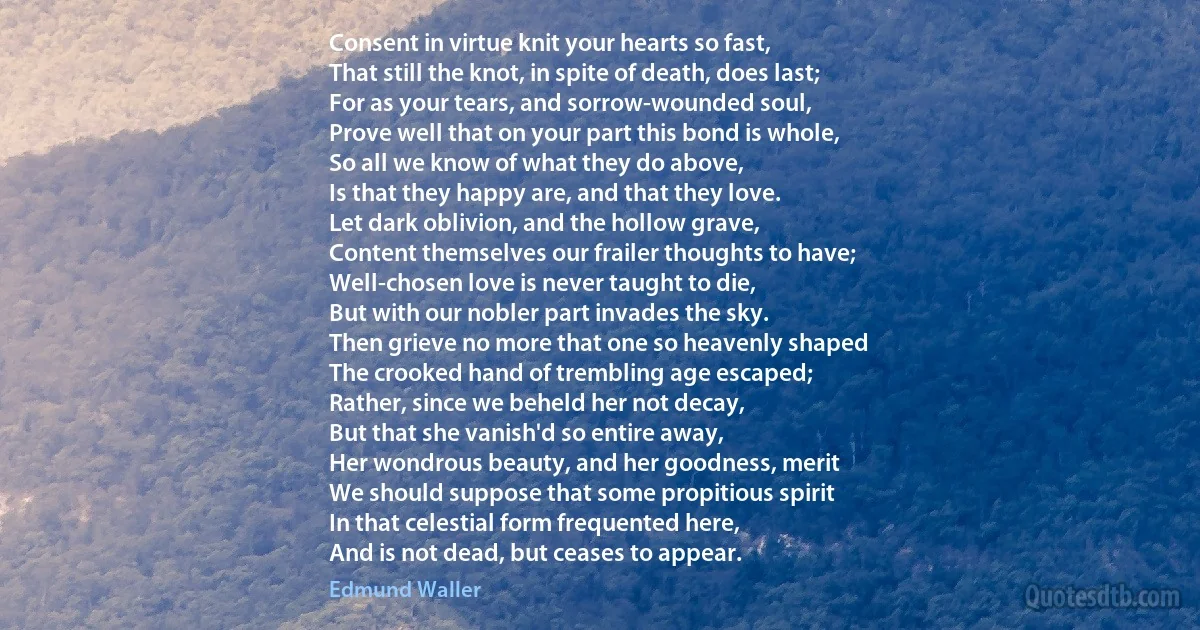
Consent in virtue knit your hearts so fast, That still the knot, in spite of death, does last; For as your tears, and sorrow-wounded soul, Prove well that on your part this bond is whole, So all we know of what they do above, Is that they happy are, and that they love. Let dark oblivion, and the hollow grave, Content themselves our frailer thoughts to have; Well-chosen love is never taught to die, But with our nobler part invades the sky. Then grieve no more that one so heavenly shaped The crooked hand of trembling age escaped; Rather, since we beheld her not decay, But that she vanish'd so entire away, Her wondrous beauty, and her goodness, merit We should suppose that some propitious spirit In that celestial form frequented here, And is not dead, but ceases to appear.
Edmund WallerRelated topics
above age appear beauty celestial consent content dark dead death die entire form goodness grave happy knot last love merit oblivion prove should sky soul spirit suppose teach trembling virtue well wondrous tears heartsRelated quotes
For what advantage is it, that the world enjoys profound peace, if thou art at war with thyself? This then is the peace we should keep. If we have it, nothing from without will be able to harm us. And to this end the public peace contributes no little: whence it is said, ‘That we may lead a quiet and peaceable life.' But if any one is disturbed when there is quiet, he is a miserable creature. Seest thou that He speaks of this peace which I call the third (inner, ed.) kind? Therefore when he has said, ‘that we may lead a quiet and peaceable life,' he does not stop there, but adds ‘in all godliness and honesty.' But we cannot live in godliness and honesty, unless that peace be established. For when curious reasonings disturb our faith, what peace is there? or when spirits of uncleanness, what peace is there?

John Chrysostom
Behold therefore, this England of the Year 1200 was no chimerical vacuity or dreamland, peopled with mere vaporous Fantasms, Rymer's Foedera, and Doctrines of the Constitution, but a green solid place, that grew corn and several other things. The Sun shone on it; the vicissitude of seasons and human fortunes. Cloth was woven and worn; ditches were dug, furrowfields ploughed, and houses built. Day by day all men and cattle rose to labour, and night by night returned home weary to their several lairs. In wondrous Dualism, then as now, lived nations of breathing men; alternating, in all ways, between Light and Dark; between joy and sorrow, between rest and toil, between hope, hope reaching high as Heaven, and fear deep as very Hell. Not vapour Fantasms, Rymer's Foedera at all!

Thomas Carlyle
If you are a Christian, no earthly city is yours. Of our City ‘the Builder and Maker is God.' Though we may gain possession of the whole world, we are withal but strangers and sojourners in it all. We are enrolled in heaven: our citizenship is there! Let us not, after the manner of little children, despise things that are great, and admire those which are little! Not our city's greatness, but virtue of soul is our ornament and defence. If you suppose dignity to belong to a city, think how many persons must partake in this dignity, who are whoremongers, effeminate, depraved and full of ten thousand evil things, and at last despise such honour! But that City above is not of this kind; for it is impossible that he can be a partaker of it, who has not exhibited every virtue.

John Chrysostom
As for my birth month, a detail of much interest to poets, obsessed as they are with symbolic systems of all kinds: I was not pleased, during my childhood, to have been born in November, as there wasn't much inspiration for birthday party motifs. February children got hearts, May ones flowers, but what was there for me? A cake surrounded by withered leaves? November was a drab, dark and wet month, lacking even snow; its only noteworthy festival was Remembrance Day. But in adult life I discovered that November was, astrologically speaking, the month of sex, death and regeneration, and that November First was the Day of the Dead. It still wouldn't have been much good for birthday parties, but it was just fine for poetry, which tends to revolve a good deal around sex and death, with regeneration optional.

Margaret Atwood
Had there not been a natural goodness and indestructible force in my father, I see not how be could have bodied himself forth from these mean impediments. I suppose good precepts were not wanting. There was the Bible to read. Old John Orr, the schoolmaster, used from time to time to lodge with them; be was religious and enthusiastic (though in practice irregular with drink). In my grandfather, also, there seems to have been a certain geniality; for instance, he and a neighbor, Thomas Hogg, read "Anson's Voyages;" also tho "Arabian Nights," for which latter my father, armed with zealous conviction, scrupled not to censure them openly. By one means and another, at an early age he had acquired principles, lights that not only flickered, but shone steadily to guide his way.

Thomas Carlyle
